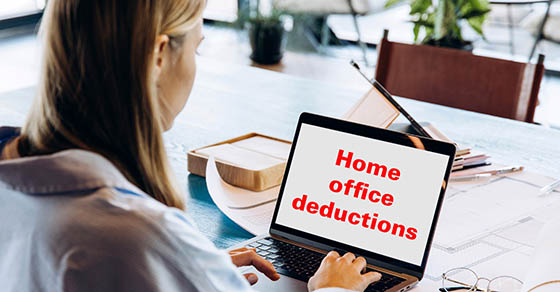Under the Tax Cuts and Jobs Act, employees can no longer claim the home office deduction. If, however, you run a business from your home or are otherwise self-employed and use part of your home for business purposes, the home office deduction may still be available to you.
Home-related expenses
Homeowners know that they can claim itemized deductions for property tax and mortgage interest on their principal residences, subject to certain limits. Most other home-related expenses, such as utilities, insurance and repairs, aren’t deductible.
But if you use part of your home for business purposes, you may be entitled to deduct a portion of these expenses, as well as depreciation. Or you might be able to claim the simplified home office deduction of $5 per square foot, up to 300 square feet ($1,500).
Regular and exclusive use
You might qualify for the home office deduction if part of your home is used as your principal place of business “regularly and exclusively,” defined as follows:
1. Regular use. You use a specific area of your home for business on a regular basis. Incidental or occasional business use is not regular use.
2. Exclusive use. You use the specific area of your home only for business. It’s not necessary for the space to be physically partitioned off. But, you don’t meet the requirements if the area is used both for business and personal purposes, such as a home office that also serves as a guest bedroom.
Regular and exclusive business use of the space aren’t, however, the only criteria.
Principal place of business
Your home office will qualify as your principal place of business if you 1) use the space exclusively and regularly for administrative or management activities of your business, and 2) don’t have another fixed location where you conduct substantial administrative or management activities.
Examples of activities that are administrative or managerial in nature include:
- Billing customers, clients or patients,
- Keeping books and records,
- Ordering supplies,
- Setting up appointments, and
- Forwarding orders or writing reports.
- Meetings or storage
If your home isn’t your principal place of business, you may still be able to deduct home office expenses if you physically meet with patients, clients or customers on your premises. The use of your home must be substantial and integral to the business conducted.
Alternatively, you may be able to claim the home office deduction if you have a storage area in your home — or in a separate free-standing structure (such as a studio, workshop, garage or barn) — that’s used exclusively and regularly for your business.
Valuable tax-savings
The home office deduction can provide a valuable tax-saving opportunity for business owners and other self-employed taxpayers who work from home. If you’re not sure whether you qualify or if you have other questions, please contact us.
© 2018





